Analyzing Strategic Culture and Its Impact on Stanbic Bank's Policies
VerifiedAdded on 2020/07/22
|14
|4306
|65
Report
AI Summary
This report provides a comprehensive analysis of Stanbic Bank's strategic culture and its impact on inter-organizational policies and decision-making. It examines the influence of various factors, including social, technological, economic, environmental, and political (STEEP analysis), on the bank's operations. The report delves into the impact of culture, language, ethos, and geographical location on inter-organizational strategy, and explores how the bank can exploit potential outcomes from changes in these factors. It also assesses the roles of religion, political structure, cultural factors, ethnicity, globalization, and business models (capitalist, socialist, and mixed) in shaping the bank's policies and strategies. Furthermore, the report includes a stakeholder analysis, discussing how different stakeholders structure themselves and utilize their power and status. The report concludes with a discussion on developing discussions with stakeholders to challenge the status quo.
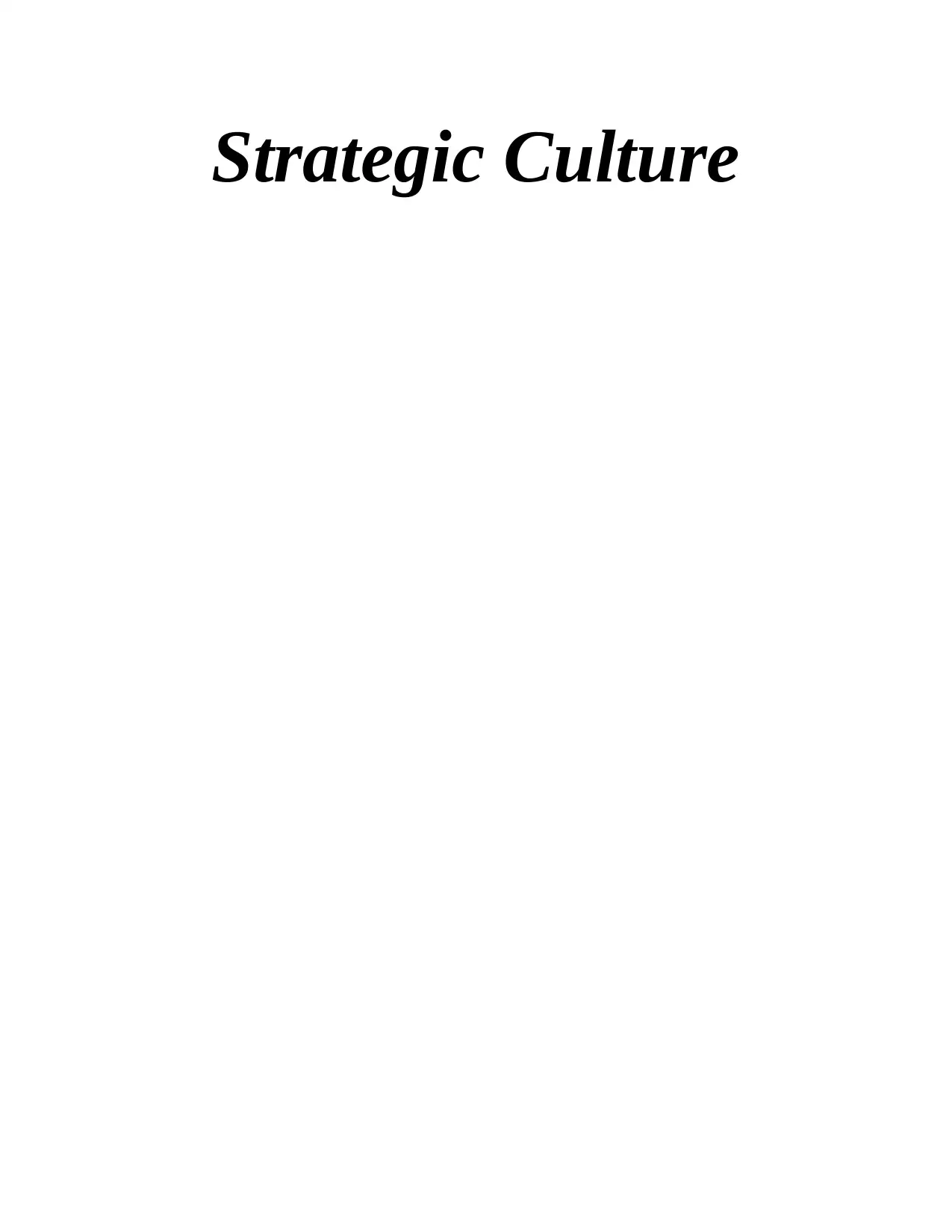
Strategic Culture
Paraphrase This Document
Need a fresh take? Get an instant paraphrase of this document with our AI Paraphraser
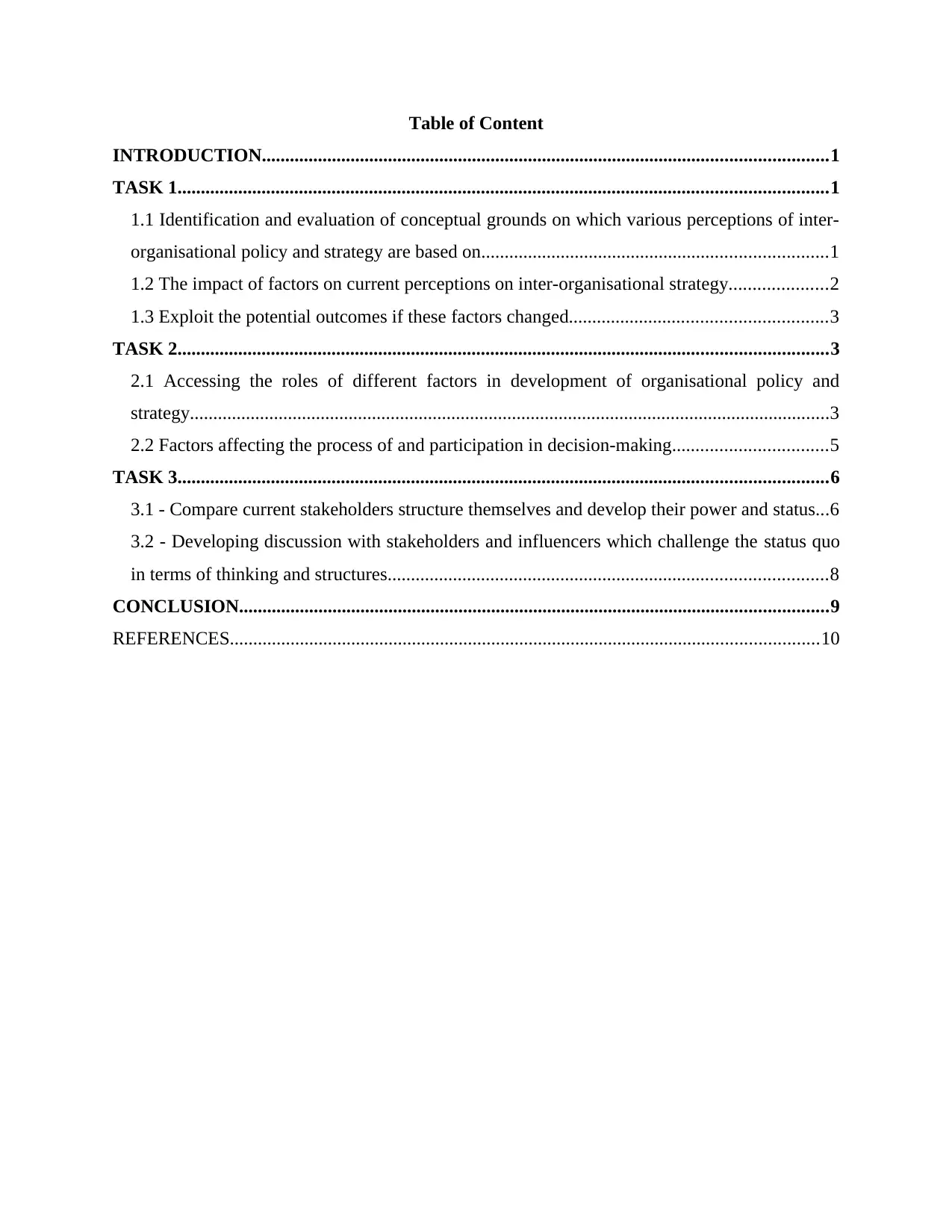
Table of Content
INTRODUCTION.........................................................................................................................1
TASK 1...........................................................................................................................................1
1.1 Identification and evaluation of conceptual grounds on which various perceptions of inter-
organisational policy and strategy are based on..........................................................................1
1.2 The impact of factors on current perceptions on inter-organisational strategy.....................2
1.3 Exploit the potential outcomes if these factors changed.......................................................3
TASK 2...........................................................................................................................................3
2.1 Accessing the roles of different factors in development of organisational policy and
strategy.........................................................................................................................................3
2.2 Factors affecting the process of and participation in decision-making.................................5
TASK 3...........................................................................................................................................6
3.1 - Compare current stakeholders structure themselves and develop their power and status...6
3.2 - Developing discussion with stakeholders and influencers which challenge the status quo
in terms of thinking and structures..............................................................................................8
CONCLUSION..............................................................................................................................9
REFERENCES..............................................................................................................................10
INTRODUCTION.........................................................................................................................1
TASK 1...........................................................................................................................................1
1.1 Identification and evaluation of conceptual grounds on which various perceptions of inter-
organisational policy and strategy are based on..........................................................................1
1.2 The impact of factors on current perceptions on inter-organisational strategy.....................2
1.3 Exploit the potential outcomes if these factors changed.......................................................3
TASK 2...........................................................................................................................................3
2.1 Accessing the roles of different factors in development of organisational policy and
strategy.........................................................................................................................................3
2.2 Factors affecting the process of and participation in decision-making.................................5
TASK 3...........................................................................................................................................6
3.1 - Compare current stakeholders structure themselves and develop their power and status...6
3.2 - Developing discussion with stakeholders and influencers which challenge the status quo
in terms of thinking and structures..............................................................................................8
CONCLUSION..............................................................................................................................9
REFERENCES..............................................................................................................................10

⊘ This is a preview!⊘
Do you want full access?
Subscribe today to unlock all pages.

Trusted by 1+ million students worldwide
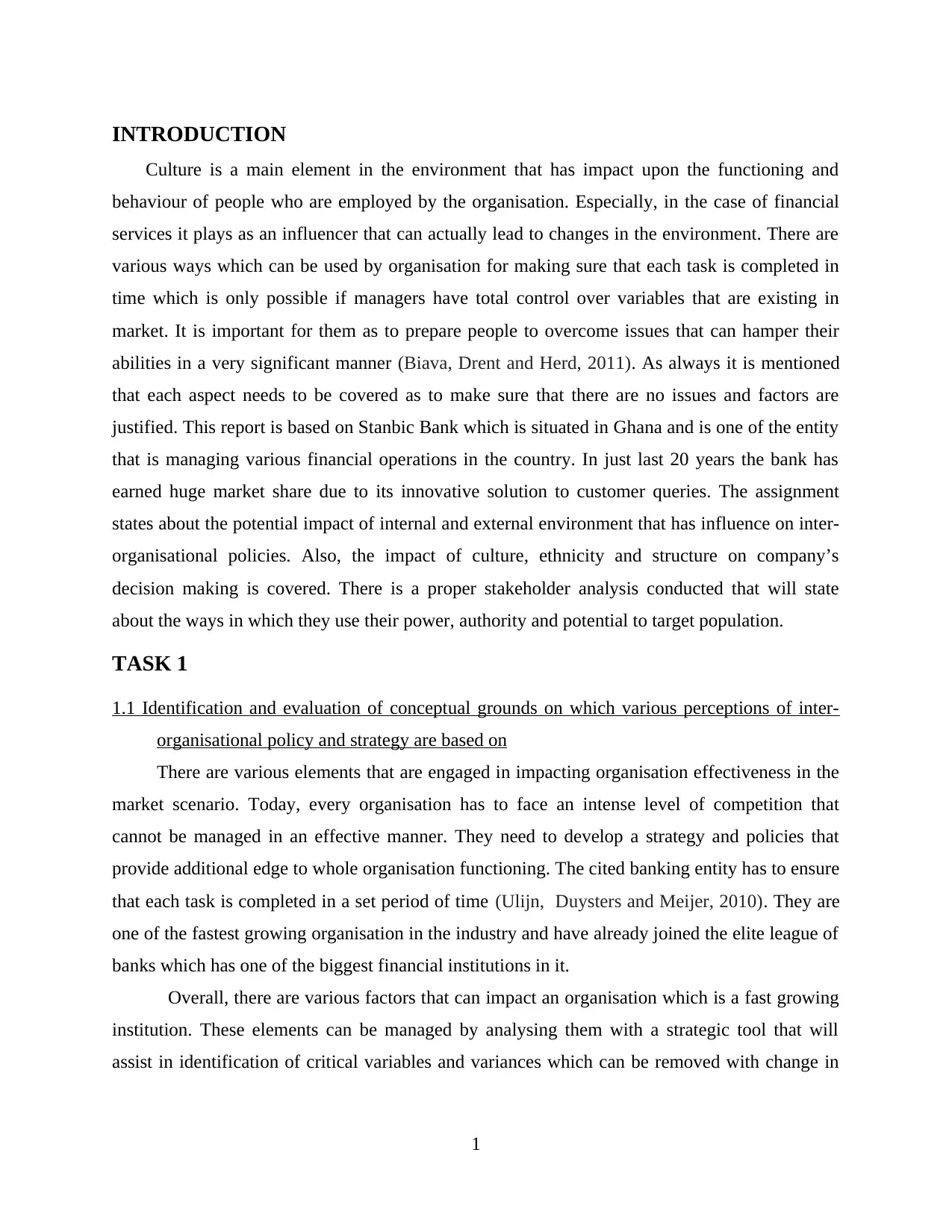
INTRODUCTION
Culture is a main element in the environment that has impact upon the functioning and
behaviour of people who are employed by the organisation. Especially, in the case of financial
services it plays as an influencer that can actually lead to changes in the environment. There are
various ways which can be used by organisation for making sure that each task is completed in
time which is only possible if managers have total control over variables that are existing in
market. It is important for them as to prepare people to overcome issues that can hamper their
abilities in a very significant manner (Biava, Drent and Herd, 2011). As always it is mentioned
that each aspect needs to be covered as to make sure that there are no issues and factors are
justified. This report is based on Stanbic Bank which is situated in Ghana and is one of the entity
that is managing various financial operations in the country. In just last 20 years the bank has
earned huge market share due to its innovative solution to customer queries. The assignment
states about the potential impact of internal and external environment that has influence on inter-
organisational policies. Also, the impact of culture, ethnicity and structure on company’s
decision making is covered. There is a proper stakeholder analysis conducted that will state
about the ways in which they use their power, authority and potential to target population.
TASK 1
1.1 Identification and evaluation of conceptual grounds on which various perceptions of inter-
organisational policy and strategy are based on
There are various elements that are engaged in impacting organisation effectiveness in the
market scenario. Today, every organisation has to face an intense level of competition that
cannot be managed in an effective manner. They need to develop a strategy and policies that
provide additional edge to whole organisation functioning. The cited banking entity has to ensure
that each task is completed in a set period of time (Ulijn, Duysters and Meijer, 2010). They are
one of the fastest growing organisation in the industry and have already joined the elite league of
banks which has one of the biggest financial institutions in it.
Overall, there are various factors that can impact an organisation which is a fast growing
institution. These elements can be managed by analysing them with a strategic tool that will
assist in identification of critical variables and variances which can be removed with change in
1
Culture is a main element in the environment that has impact upon the functioning and
behaviour of people who are employed by the organisation. Especially, in the case of financial
services it plays as an influencer that can actually lead to changes in the environment. There are
various ways which can be used by organisation for making sure that each task is completed in
time which is only possible if managers have total control over variables that are existing in
market. It is important for them as to prepare people to overcome issues that can hamper their
abilities in a very significant manner (Biava, Drent and Herd, 2011). As always it is mentioned
that each aspect needs to be covered as to make sure that there are no issues and factors are
justified. This report is based on Stanbic Bank which is situated in Ghana and is one of the entity
that is managing various financial operations in the country. In just last 20 years the bank has
earned huge market share due to its innovative solution to customer queries. The assignment
states about the potential impact of internal and external environment that has influence on inter-
organisational policies. Also, the impact of culture, ethnicity and structure on company’s
decision making is covered. There is a proper stakeholder analysis conducted that will state
about the ways in which they use their power, authority and potential to target population.
TASK 1
1.1 Identification and evaluation of conceptual grounds on which various perceptions of inter-
organisational policy and strategy are based on
There are various elements that are engaged in impacting organisation effectiveness in the
market scenario. Today, every organisation has to face an intense level of competition that
cannot be managed in an effective manner. They need to develop a strategy and policies that
provide additional edge to whole organisation functioning. The cited banking entity has to ensure
that each task is completed in a set period of time (Ulijn, Duysters and Meijer, 2010). They are
one of the fastest growing organisation in the industry and have already joined the elite league of
banks which has one of the biggest financial institutions in it.
Overall, there are various factors that can impact an organisation which is a fast growing
institution. These elements can be managed by analysing them with a strategic tool that will
assist in identification of critical variables and variances which can be removed with change in
1
Paraphrase This Document
Need a fresh take? Get an instant paraphrase of this document with our AI Paraphraser
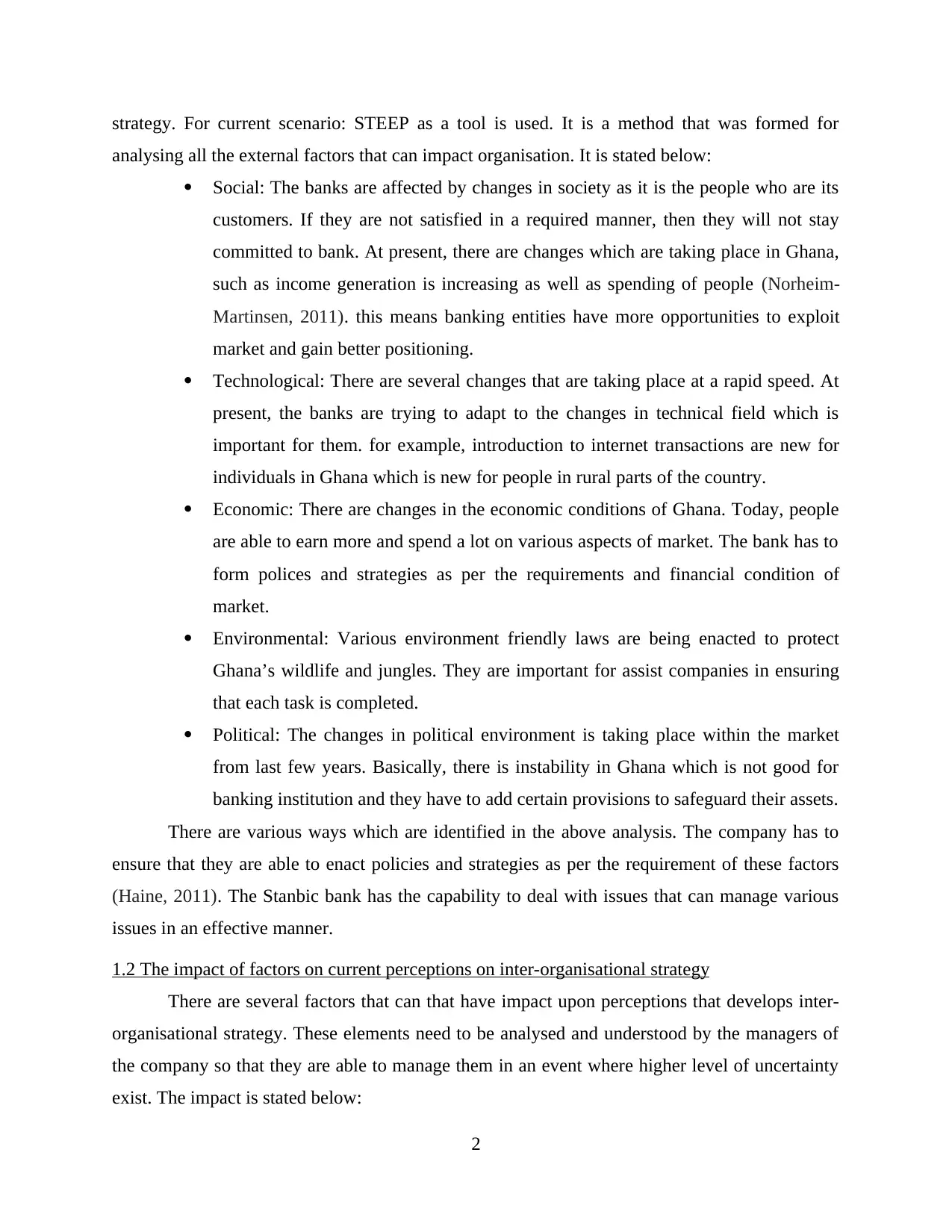
strategy. For current scenario: STEEP as a tool is used. It is a method that was formed for
analysing all the external factors that can impact organisation. It is stated below:
Social: The banks are affected by changes in society as it is the people who are its
customers. If they are not satisfied in a required manner, then they will not stay
committed to bank. At present, there are changes which are taking place in Ghana,
such as income generation is increasing as well as spending of people (Norheim-
Martinsen, 2011). this means banking entities have more opportunities to exploit
market and gain better positioning.
Technological: There are several changes that are taking place at a rapid speed. At
present, the banks are trying to adapt to the changes in technical field which is
important for them. for example, introduction to internet transactions are new for
individuals in Ghana which is new for people in rural parts of the country.
Economic: There are changes in the economic conditions of Ghana. Today, people
are able to earn more and spend a lot on various aspects of market. The bank has to
form polices and strategies as per the requirements and financial condition of
market.
Environmental: Various environment friendly laws are being enacted to protect
Ghana’s wildlife and jungles. They are important for assist companies in ensuring
that each task is completed.
Political: The changes in political environment is taking place within the market
from last few years. Basically, there is instability in Ghana which is not good for
banking institution and they have to add certain provisions to safeguard their assets.
There are various ways which are identified in the above analysis. The company has to
ensure that they are able to enact policies and strategies as per the requirement of these factors
(Haine, 2011). The Stanbic bank has the capability to deal with issues that can manage various
issues in an effective manner.
1.2 The impact of factors on current perceptions on inter-organisational strategy
There are several factors that can that have impact upon perceptions that develops inter-
organisational strategy. These elements need to be analysed and understood by the managers of
the company so that they are able to manage them in an event where higher level of uncertainty
exist. The impact is stated below:
2
analysing all the external factors that can impact organisation. It is stated below:
Social: The banks are affected by changes in society as it is the people who are its
customers. If they are not satisfied in a required manner, then they will not stay
committed to bank. At present, there are changes which are taking place in Ghana,
such as income generation is increasing as well as spending of people (Norheim-
Martinsen, 2011). this means banking entities have more opportunities to exploit
market and gain better positioning.
Technological: There are several changes that are taking place at a rapid speed. At
present, the banks are trying to adapt to the changes in technical field which is
important for them. for example, introduction to internet transactions are new for
individuals in Ghana which is new for people in rural parts of the country.
Economic: There are changes in the economic conditions of Ghana. Today, people
are able to earn more and spend a lot on various aspects of market. The bank has to
form polices and strategies as per the requirements and financial condition of
market.
Environmental: Various environment friendly laws are being enacted to protect
Ghana’s wildlife and jungles. They are important for assist companies in ensuring
that each task is completed.
Political: The changes in political environment is taking place within the market
from last few years. Basically, there is instability in Ghana which is not good for
banking institution and they have to add certain provisions to safeguard their assets.
There are various ways which are identified in the above analysis. The company has to
ensure that they are able to enact policies and strategies as per the requirement of these factors
(Haine, 2011). The Stanbic bank has the capability to deal with issues that can manage various
issues in an effective manner.
1.2 The impact of factors on current perceptions on inter-organisational strategy
There are several factors that can that have impact upon perceptions that develops inter-
organisational strategy. These elements need to be analysed and understood by the managers of
the company so that they are able to manage them in an event where higher level of uncertainty
exist. The impact is stated below:
2
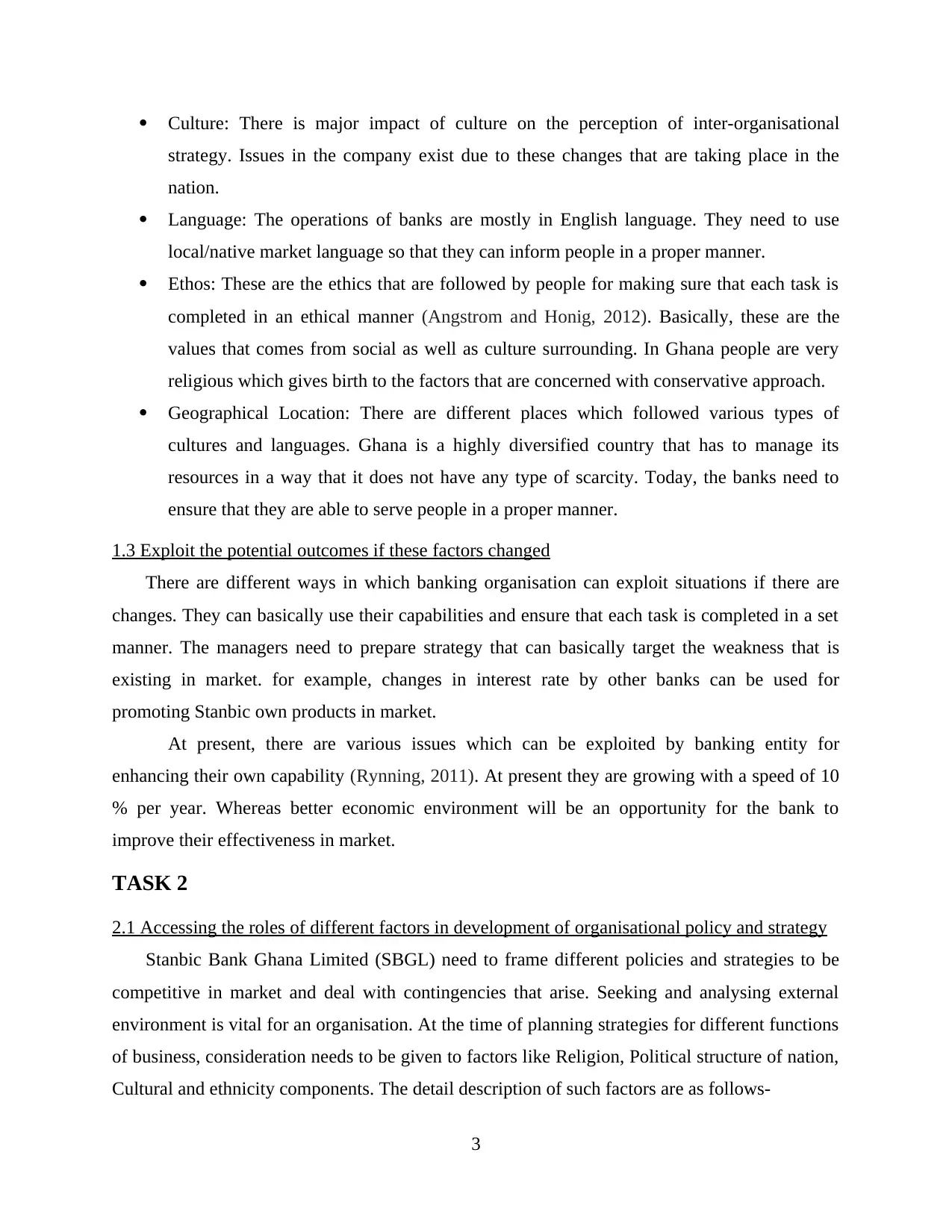
Culture: There is major impact of culture on the perception of inter-organisational
strategy. Issues in the company exist due to these changes that are taking place in the
nation.
Language: The operations of banks are mostly in English language. They need to use
local/native market language so that they can inform people in a proper manner.
Ethos: These are the ethics that are followed by people for making sure that each task is
completed in an ethical manner (Angstrom and Honig, 2012). Basically, these are the
values that comes from social as well as culture surrounding. In Ghana people are very
religious which gives birth to the factors that are concerned with conservative approach.
Geographical Location: There are different places which followed various types of
cultures and languages. Ghana is a highly diversified country that has to manage its
resources in a way that it does not have any type of scarcity. Today, the banks need to
ensure that they are able to serve people in a proper manner.
1.3 Exploit the potential outcomes if these factors changed
There are different ways in which banking organisation can exploit situations if there are
changes. They can basically use their capabilities and ensure that each task is completed in a set
manner. The managers need to prepare strategy that can basically target the weakness that is
existing in market. for example, changes in interest rate by other banks can be used for
promoting Stanbic own products in market.
At present, there are various issues which can be exploited by banking entity for
enhancing their own capability (Rynning, 2011). At present they are growing with a speed of 10
% per year. Whereas better economic environment will be an opportunity for the bank to
improve their effectiveness in market.
TASK 2
2.1 Accessing the roles of different factors in development of organisational policy and strategy
Stanbic Bank Ghana Limited (SBGL) need to frame different policies and strategies to be
competitive in market and deal with contingencies that arise. Seeking and analysing external
environment is vital for an organisation. At the time of planning strategies for different functions
of business, consideration needs to be given to factors like Religion, Political structure of nation,
Cultural and ethnicity components. The detail description of such factors are as follows-
3
strategy. Issues in the company exist due to these changes that are taking place in the
nation.
Language: The operations of banks are mostly in English language. They need to use
local/native market language so that they can inform people in a proper manner.
Ethos: These are the ethics that are followed by people for making sure that each task is
completed in an ethical manner (Angstrom and Honig, 2012). Basically, these are the
values that comes from social as well as culture surrounding. In Ghana people are very
religious which gives birth to the factors that are concerned with conservative approach.
Geographical Location: There are different places which followed various types of
cultures and languages. Ghana is a highly diversified country that has to manage its
resources in a way that it does not have any type of scarcity. Today, the banks need to
ensure that they are able to serve people in a proper manner.
1.3 Exploit the potential outcomes if these factors changed
There are different ways in which banking organisation can exploit situations if there are
changes. They can basically use their capabilities and ensure that each task is completed in a set
manner. The managers need to prepare strategy that can basically target the weakness that is
existing in market. for example, changes in interest rate by other banks can be used for
promoting Stanbic own products in market.
At present, there are various issues which can be exploited by banking entity for
enhancing their own capability (Rynning, 2011). At present they are growing with a speed of 10
% per year. Whereas better economic environment will be an opportunity for the bank to
improve their effectiveness in market.
TASK 2
2.1 Accessing the roles of different factors in development of organisational policy and strategy
Stanbic Bank Ghana Limited (SBGL) need to frame different policies and strategies to be
competitive in market and deal with contingencies that arise. Seeking and analysing external
environment is vital for an organisation. At the time of planning strategies for different functions
of business, consideration needs to be given to factors like Religion, Political structure of nation,
Cultural and ethnicity components. The detail description of such factors are as follows-
3
⊘ This is a preview!⊘
Do you want full access?
Subscribe today to unlock all pages.

Trusted by 1+ million students worldwide
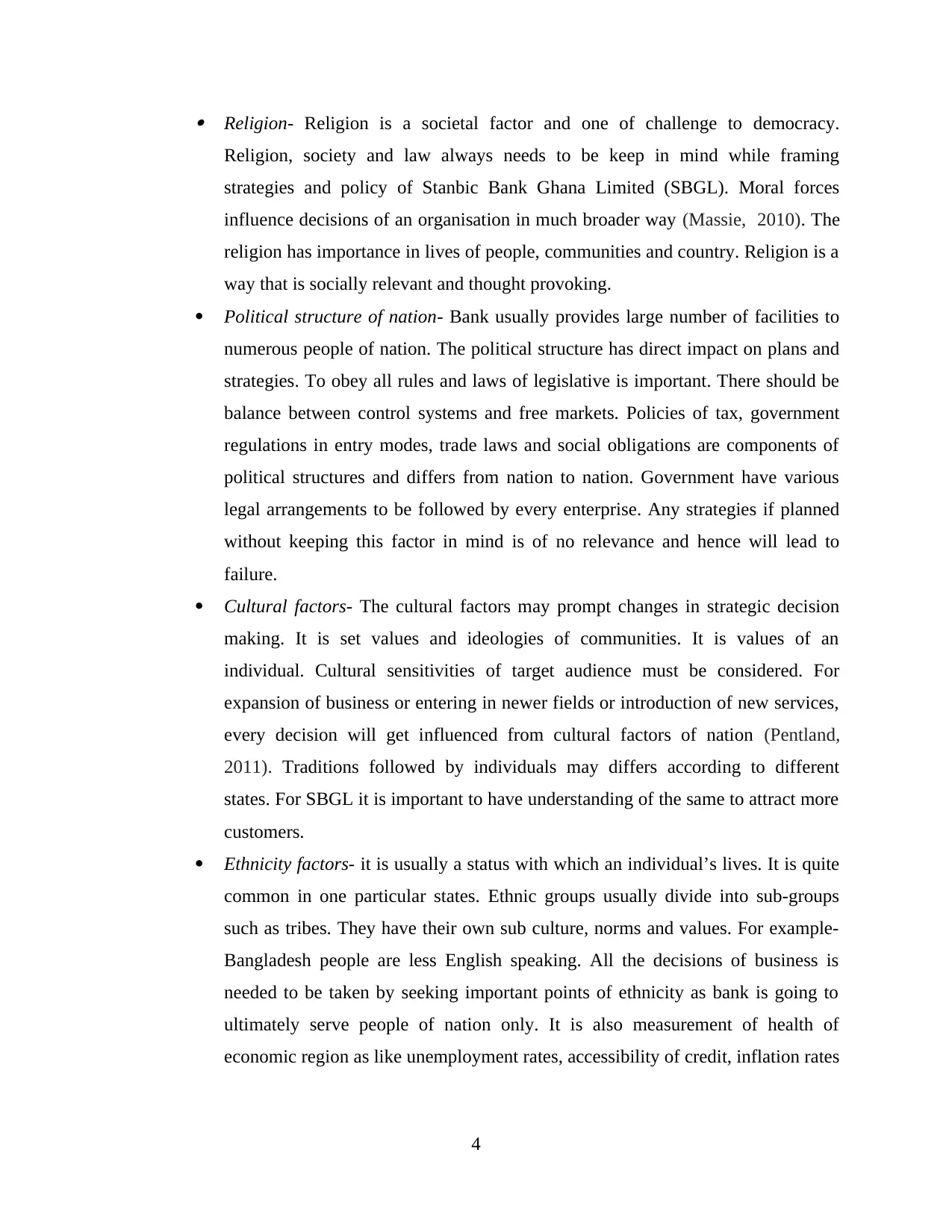
Religion- Religion is a societal factor and one of challenge to democracy.
Religion, society and law always needs to be keep in mind while framing
strategies and policy of Stanbic Bank Ghana Limited (SBGL). Moral forces
influence decisions of an organisation in much broader way (Massie, 2010). The
religion has importance in lives of people, communities and country. Religion is a
way that is socially relevant and thought provoking.
Political structure of nation- Bank usually provides large number of facilities to
numerous people of nation. The political structure has direct impact on plans and
strategies. To obey all rules and laws of legislative is important. There should be
balance between control systems and free markets. Policies of tax, government
regulations in entry modes, trade laws and social obligations are components of
political structures and differs from nation to nation. Government have various
legal arrangements to be followed by every enterprise. Any strategies if planned
without keeping this factor in mind is of no relevance and hence will lead to
failure.
Cultural factors- The cultural factors may prompt changes in strategic decision
making. It is set values and ideologies of communities. It is values of an
individual. Cultural sensitivities of target audience must be considered. For
expansion of business or entering in newer fields or introduction of new services,
every decision will get influenced from cultural factors of nation (Pentland,
2011). Traditions followed by individuals may differs according to different
states. For SBGL it is important to have understanding of the same to attract more
customers.
Ethnicity factors- it is usually a status with which an individual’s lives. It is quite
common in one particular states. Ethnic groups usually divide into sub-groups
such as tribes. They have their own sub culture, norms and values. For example-
Bangladesh people are less English speaking. All the decisions of business is
needed to be taken by seeking important points of ethnicity as bank is going to
ultimately serve people of nation only. It is also measurement of health of
economic region as like unemployment rates, accessibility of credit, inflation rates
4
Religion, society and law always needs to be keep in mind while framing
strategies and policy of Stanbic Bank Ghana Limited (SBGL). Moral forces
influence decisions of an organisation in much broader way (Massie, 2010). The
religion has importance in lives of people, communities and country. Religion is a
way that is socially relevant and thought provoking.
Political structure of nation- Bank usually provides large number of facilities to
numerous people of nation. The political structure has direct impact on plans and
strategies. To obey all rules and laws of legislative is important. There should be
balance between control systems and free markets. Policies of tax, government
regulations in entry modes, trade laws and social obligations are components of
political structures and differs from nation to nation. Government have various
legal arrangements to be followed by every enterprise. Any strategies if planned
without keeping this factor in mind is of no relevance and hence will lead to
failure.
Cultural factors- The cultural factors may prompt changes in strategic decision
making. It is set values and ideologies of communities. It is values of an
individual. Cultural sensitivities of target audience must be considered. For
expansion of business or entering in newer fields or introduction of new services,
every decision will get influenced from cultural factors of nation (Pentland,
2011). Traditions followed by individuals may differs according to different
states. For SBGL it is important to have understanding of the same to attract more
customers.
Ethnicity factors- it is usually a status with which an individual’s lives. It is quite
common in one particular states. Ethnic groups usually divide into sub-groups
such as tribes. They have their own sub culture, norms and values. For example-
Bangladesh people are less English speaking. All the decisions of business is
needed to be taken by seeking important points of ethnicity as bank is going to
ultimately serve people of nation only. It is also measurement of health of
economic region as like unemployment rates, accessibility of credit, inflation rates
4
Paraphrase This Document
Need a fresh take? Get an instant paraphrase of this document with our AI Paraphraser
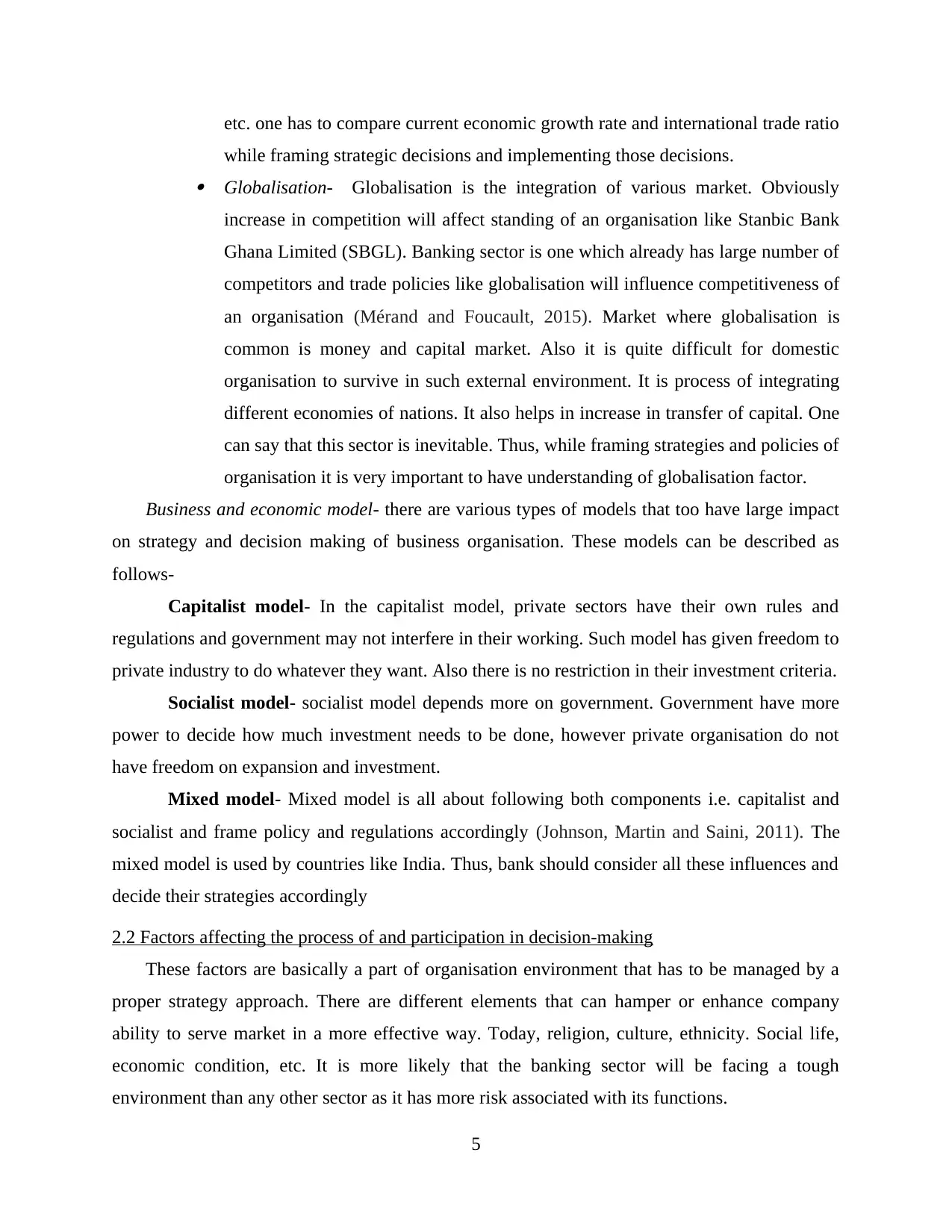
etc. one has to compare current economic growth rate and international trade ratio
while framing strategic decisions and implementing those decisions.
Globalisation- Globalisation is the integration of various market. Obviously
increase in competition will affect standing of an organisation like Stanbic Bank
Ghana Limited (SBGL). Banking sector is one which already has large number of
competitors and trade policies like globalisation will influence competitiveness of
an organisation (Mérand and Foucault, 2015). Market where globalisation is
common is money and capital market. Also it is quite difficult for domestic
organisation to survive in such external environment. It is process of integrating
different economies of nations. It also helps in increase in transfer of capital. One
can say that this sector is inevitable. Thus, while framing strategies and policies of
organisation it is very important to have understanding of globalisation factor.
Business and economic model- there are various types of models that too have large impact
on strategy and decision making of business organisation. These models can be described as
follows-
Capitalist model- In the capitalist model, private sectors have their own rules and
regulations and government may not interfere in their working. Such model has given freedom to
private industry to do whatever they want. Also there is no restriction in their investment criteria.
Socialist model- socialist model depends more on government. Government have more
power to decide how much investment needs to be done, however private organisation do not
have freedom on expansion and investment.
Mixed model- Mixed model is all about following both components i.e. capitalist and
socialist and frame policy and regulations accordingly (Johnson, Martin and Saini, 2011). The
mixed model is used by countries like India. Thus, bank should consider all these influences and
decide their strategies accordingly
2.2 Factors affecting the process of and participation in decision-making
These factors are basically a part of organisation environment that has to be managed by a
proper strategy approach. There are different elements that can hamper or enhance company
ability to serve market in a more effective way. Today, religion, culture, ethnicity. Social life,
economic condition, etc. It is more likely that the banking sector will be facing a tough
environment than any other sector as it has more risk associated with its functions.
5
while framing strategic decisions and implementing those decisions.
Globalisation- Globalisation is the integration of various market. Obviously
increase in competition will affect standing of an organisation like Stanbic Bank
Ghana Limited (SBGL). Banking sector is one which already has large number of
competitors and trade policies like globalisation will influence competitiveness of
an organisation (Mérand and Foucault, 2015). Market where globalisation is
common is money and capital market. Also it is quite difficult for domestic
organisation to survive in such external environment. It is process of integrating
different economies of nations. It also helps in increase in transfer of capital. One
can say that this sector is inevitable. Thus, while framing strategies and policies of
organisation it is very important to have understanding of globalisation factor.
Business and economic model- there are various types of models that too have large impact
on strategy and decision making of business organisation. These models can be described as
follows-
Capitalist model- In the capitalist model, private sectors have their own rules and
regulations and government may not interfere in their working. Such model has given freedom to
private industry to do whatever they want. Also there is no restriction in their investment criteria.
Socialist model- socialist model depends more on government. Government have more
power to decide how much investment needs to be done, however private organisation do not
have freedom on expansion and investment.
Mixed model- Mixed model is all about following both components i.e. capitalist and
socialist and frame policy and regulations accordingly (Johnson, Martin and Saini, 2011). The
mixed model is used by countries like India. Thus, bank should consider all these influences and
decide their strategies accordingly
2.2 Factors affecting the process of and participation in decision-making
These factors are basically a part of organisation environment that has to be managed by a
proper strategy approach. There are different elements that can hamper or enhance company
ability to serve market in a more effective way. Today, religion, culture, ethnicity. Social life,
economic condition, etc. It is more likely that the banking sector will be facing a tough
environment than any other sector as it has more risk associated with its functions.
5
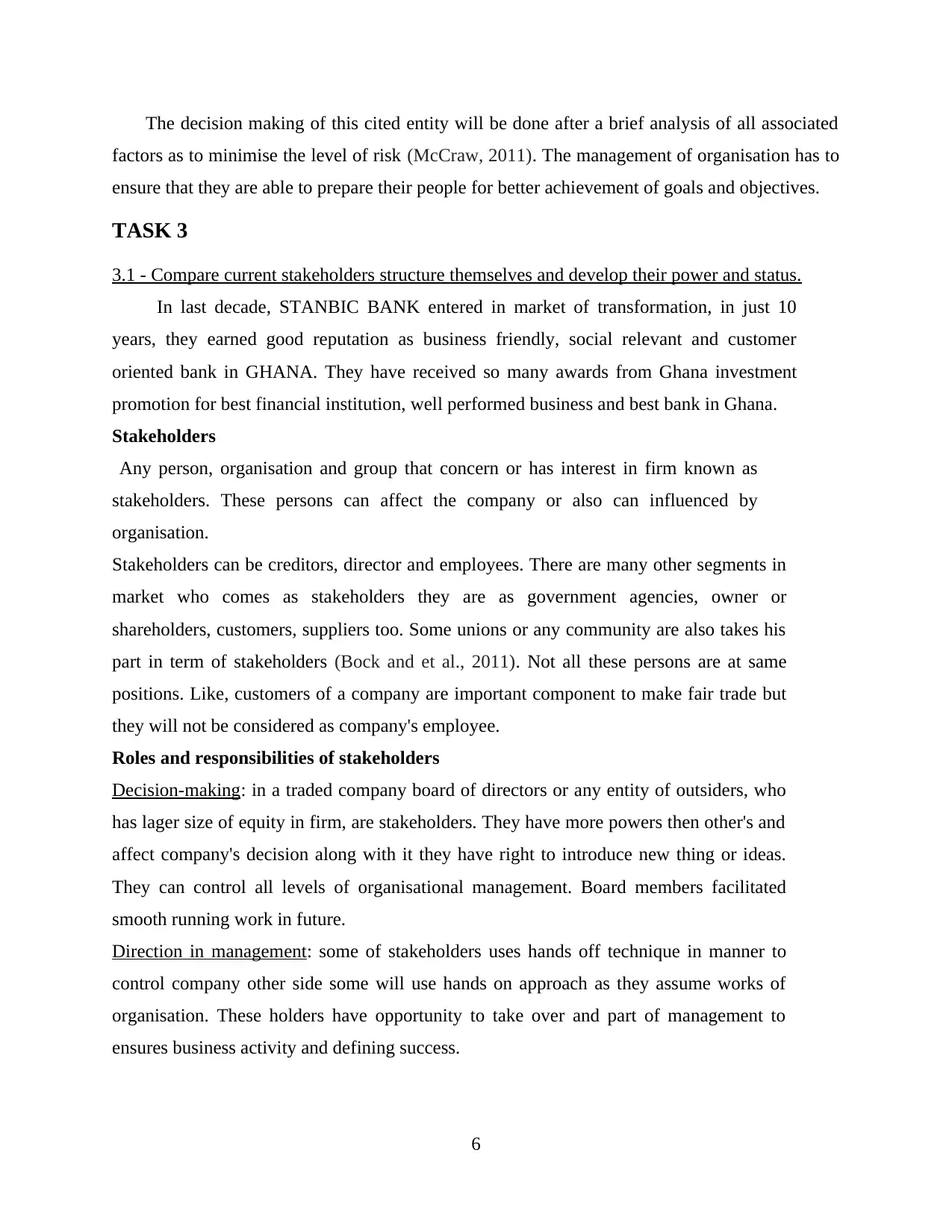
The decision making of this cited entity will be done after a brief analysis of all associated
factors as to minimise the level of risk (McCraw, 2011). The management of organisation has to
ensure that they are able to prepare their people for better achievement of goals and objectives.
TASK 3
3.1 - Compare current stakeholders structure themselves and develop their power and status.
In last decade, STANBIC BANK entered in market of transformation, in just 10
years, they earned good reputation as business friendly, social relevant and customer
oriented bank in GHANA. They have received so many awards from Ghana investment
promotion for best financial institution, well performed business and best bank in Ghana.
Stakeholders
Any person, organisation and group that concern or has interest in firm known as
stakeholders. These persons can affect the company or also can influenced by
organisation.
Stakeholders can be creditors, director and employees. There are many other segments in
market who comes as stakeholders they are as government agencies, owner or
shareholders, customers, suppliers too. Some unions or any community are also takes his
part in term of stakeholders (Bock and et al., 2011). Not all these persons are at same
positions. Like, customers of a company are important component to make fair trade but
they will not be considered as company's employee.
Roles and responsibilities of stakeholders
Decision-making: in a traded company board of directors or any entity of outsiders, who
has lager size of equity in firm, are stakeholders. They have more powers then other's and
affect company's decision along with it they have right to introduce new thing or ideas.
They can control all levels of organisational management. Board members facilitated
smooth running work in future.
Direction in management: some of stakeholders uses hands off technique in manner to
control company other side some will use hands on approach as they assume works of
organisation. These holders have opportunity to take over and part of management to
ensures business activity and defining success.
6
factors as to minimise the level of risk (McCraw, 2011). The management of organisation has to
ensure that they are able to prepare their people for better achievement of goals and objectives.
TASK 3
3.1 - Compare current stakeholders structure themselves and develop their power and status.
In last decade, STANBIC BANK entered in market of transformation, in just 10
years, they earned good reputation as business friendly, social relevant and customer
oriented bank in GHANA. They have received so many awards from Ghana investment
promotion for best financial institution, well performed business and best bank in Ghana.
Stakeholders
Any person, organisation and group that concern or has interest in firm known as
stakeholders. These persons can affect the company or also can influenced by
organisation.
Stakeholders can be creditors, director and employees. There are many other segments in
market who comes as stakeholders they are as government agencies, owner or
shareholders, customers, suppliers too. Some unions or any community are also takes his
part in term of stakeholders (Bock and et al., 2011). Not all these persons are at same
positions. Like, customers of a company are important component to make fair trade but
they will not be considered as company's employee.
Roles and responsibilities of stakeholders
Decision-making: in a traded company board of directors or any entity of outsiders, who
has lager size of equity in firm, are stakeholders. They have more powers then other's and
affect company's decision along with it they have right to introduce new thing or ideas.
They can control all levels of organisational management. Board members facilitated
smooth running work in future.
Direction in management: some of stakeholders uses hands off technique in manner to
control company other side some will use hands on approach as they assume works of
organisation. These holders have opportunity to take over and part of management to
ensures business activity and defining success.
6
⊘ This is a preview!⊘
Do you want full access?
Subscribe today to unlock all pages.

Trusted by 1+ million students worldwide
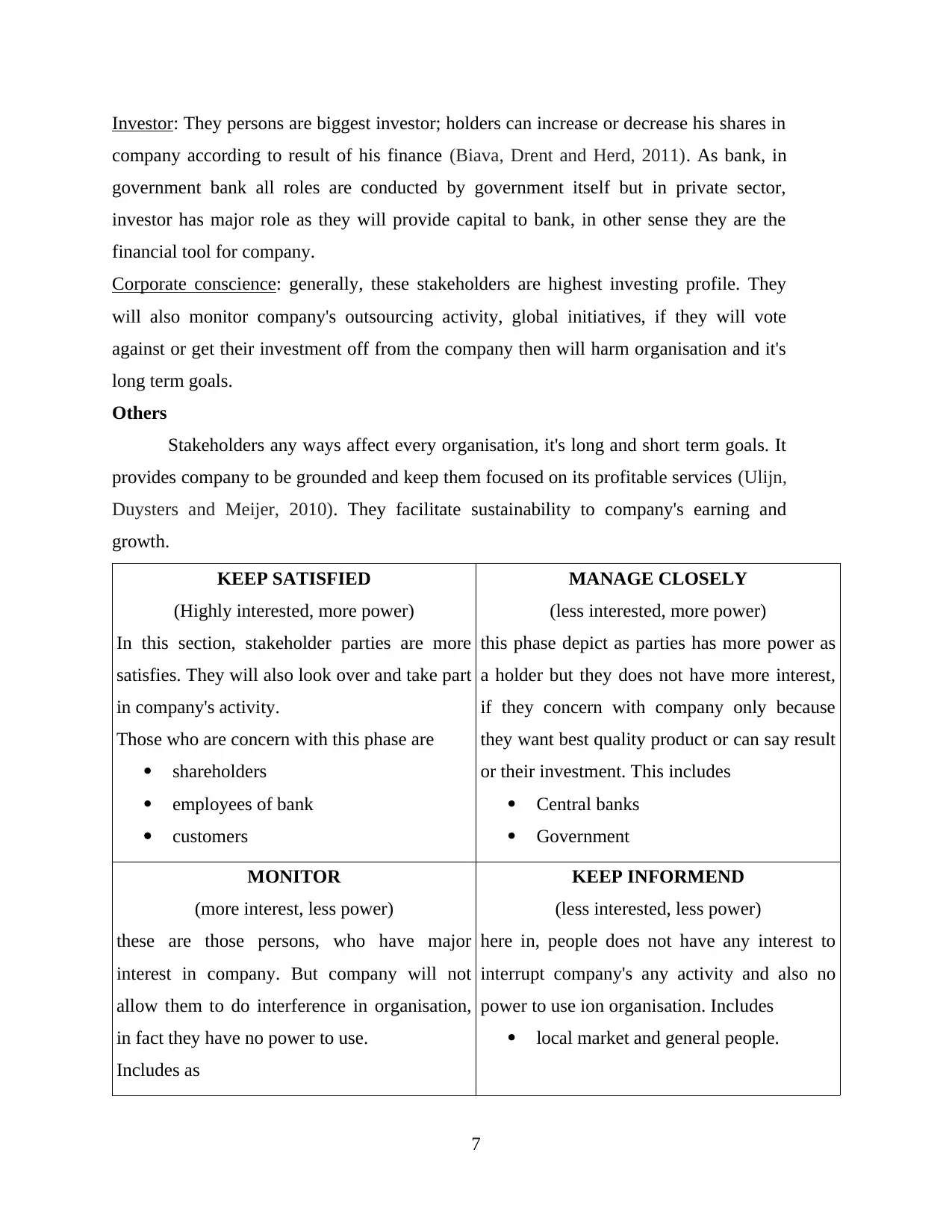
Investor: They persons are biggest investor; holders can increase or decrease his shares in
company according to result of his finance (Biava, Drent and Herd, 2011). As bank, in
government bank all roles are conducted by government itself but in private sector,
investor has major role as they will provide capital to bank, in other sense they are the
financial tool for company.
Corporate conscience: generally, these stakeholders are highest investing profile. They
will also monitor company's outsourcing activity, global initiatives, if they will vote
against or get their investment off from the company then will harm organisation and it's
long term goals.
Others
Stakeholders any ways affect every organisation, it's long and short term goals. It
provides company to be grounded and keep them focused on its profitable services (Ulijn,
Duysters and Meijer, 2010). They facilitate sustainability to company's earning and
growth.
KEEP SATISFIED
(Highly interested, more power)
In this section, stakeholder parties are more
satisfies. They will also look over and take part
in company's activity.
Those who are concern with this phase are
shareholders
employees of bank
customers
MANAGE CLOSELY
(less interested, more power)
this phase depict as parties has more power as
a holder but they does not have more interest,
if they concern with company only because
they want best quality product or can say result
or their investment. This includes
Central banks
Government
MONITOR
(more interest, less power)
these are those persons, who have major
interest in company. But company will not
allow them to do interference in organisation,
in fact they have no power to use.
Includes as
KEEP INFORMEND
(less interested, less power)
here in, people does not have any interest to
interrupt company's any activity and also no
power to use ion organisation. Includes
local market and general people.
7
company according to result of his finance (Biava, Drent and Herd, 2011). As bank, in
government bank all roles are conducted by government itself but in private sector,
investor has major role as they will provide capital to bank, in other sense they are the
financial tool for company.
Corporate conscience: generally, these stakeholders are highest investing profile. They
will also monitor company's outsourcing activity, global initiatives, if they will vote
against or get their investment off from the company then will harm organisation and it's
long term goals.
Others
Stakeholders any ways affect every organisation, it's long and short term goals. It
provides company to be grounded and keep them focused on its profitable services (Ulijn,
Duysters and Meijer, 2010). They facilitate sustainability to company's earning and
growth.
KEEP SATISFIED
(Highly interested, more power)
In this section, stakeholder parties are more
satisfies. They will also look over and take part
in company's activity.
Those who are concern with this phase are
shareholders
employees of bank
customers
MANAGE CLOSELY
(less interested, more power)
this phase depict as parties has more power as
a holder but they does not have more interest,
if they concern with company only because
they want best quality product or can say result
or their investment. This includes
Central banks
Government
MONITOR
(more interest, less power)
these are those persons, who have major
interest in company. But company will not
allow them to do interference in organisation,
in fact they have no power to use.
Includes as
KEEP INFORMEND
(less interested, less power)
here in, people does not have any interest to
interrupt company's any activity and also no
power to use ion organisation. Includes
local market and general people.
7
Paraphrase This Document
Need a fresh take? Get an instant paraphrase of this document with our AI Paraphraser
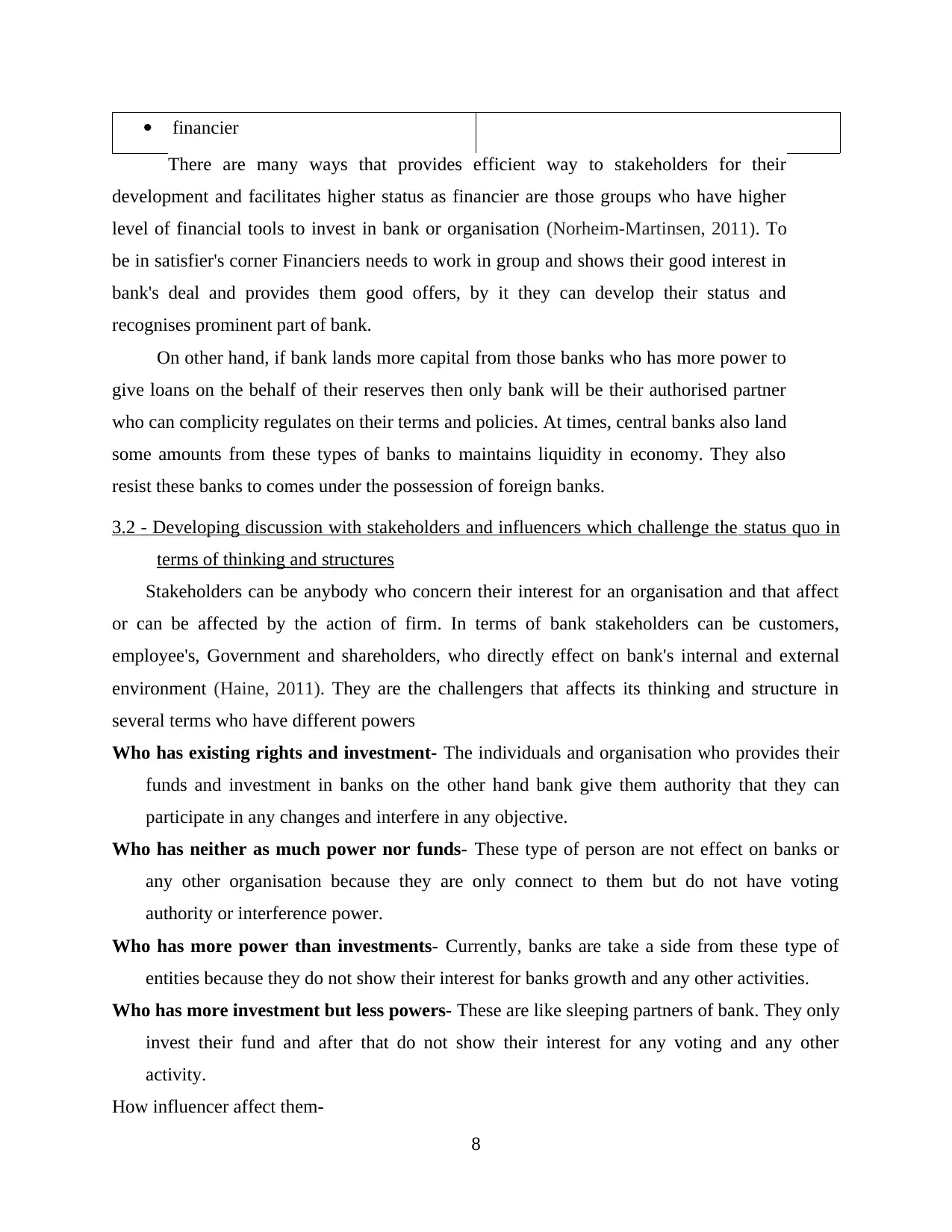
financier
There are many ways that provides efficient way to stakeholders for their
development and facilitates higher status as financier are those groups who have higher
level of financial tools to invest in bank or organisation (Norheim-Martinsen, 2011). To
be in satisfier's corner Financiers needs to work in group and shows their good interest in
bank's deal and provides them good offers, by it they can develop their status and
recognises prominent part of bank.
On other hand, if bank lands more capital from those banks who has more power to
give loans on the behalf of their reserves then only bank will be their authorised partner
who can complicity regulates on their terms and policies. At times, central banks also land
some amounts from these types of banks to maintains liquidity in economy. They also
resist these banks to comes under the possession of foreign banks.
3.2 - Developing discussion with stakeholders and influencers which challenge the status quo in
terms of thinking and structures
Stakeholders can be anybody who concern their interest for an organisation and that affect
or can be affected by the action of firm. In terms of bank stakeholders can be customers,
employee's, Government and shareholders, who directly effect on bank's internal and external
environment (Haine, 2011). They are the challengers that affects its thinking and structure in
several terms who have different powers
Who has existing rights and investment- The individuals and organisation who provides their
funds and investment in banks on the other hand bank give them authority that they can
participate in any changes and interfere in any objective.
Who has neither as much power nor funds- These type of person are not effect on banks or
any other organisation because they are only connect to them but do not have voting
authority or interference power.
Who has more power than investments- Currently, banks are take a side from these type of
entities because they do not show their interest for banks growth and any other activities.
Who has more investment but less powers- These are like sleeping partners of bank. They only
invest their fund and after that do not show their interest for any voting and any other
activity.
How influencer affect them-
8
There are many ways that provides efficient way to stakeholders for their
development and facilitates higher status as financier are those groups who have higher
level of financial tools to invest in bank or organisation (Norheim-Martinsen, 2011). To
be in satisfier's corner Financiers needs to work in group and shows their good interest in
bank's deal and provides them good offers, by it they can develop their status and
recognises prominent part of bank.
On other hand, if bank lands more capital from those banks who has more power to
give loans on the behalf of their reserves then only bank will be their authorised partner
who can complicity regulates on their terms and policies. At times, central banks also land
some amounts from these types of banks to maintains liquidity in economy. They also
resist these banks to comes under the possession of foreign banks.
3.2 - Developing discussion with stakeholders and influencers which challenge the status quo in
terms of thinking and structures
Stakeholders can be anybody who concern their interest for an organisation and that affect
or can be affected by the action of firm. In terms of bank stakeholders can be customers,
employee's, Government and shareholders, who directly effect on bank's internal and external
environment (Haine, 2011). They are the challengers that affects its thinking and structure in
several terms who have different powers
Who has existing rights and investment- The individuals and organisation who provides their
funds and investment in banks on the other hand bank give them authority that they can
participate in any changes and interfere in any objective.
Who has neither as much power nor funds- These type of person are not effect on banks or
any other organisation because they are only connect to them but do not have voting
authority or interference power.
Who has more power than investments- Currently, banks are take a side from these type of
entities because they do not show their interest for banks growth and any other activities.
Who has more investment but less powers- These are like sleeping partners of bank. They only
invest their fund and after that do not show their interest for any voting and any other
activity.
How influencer affect them-
8
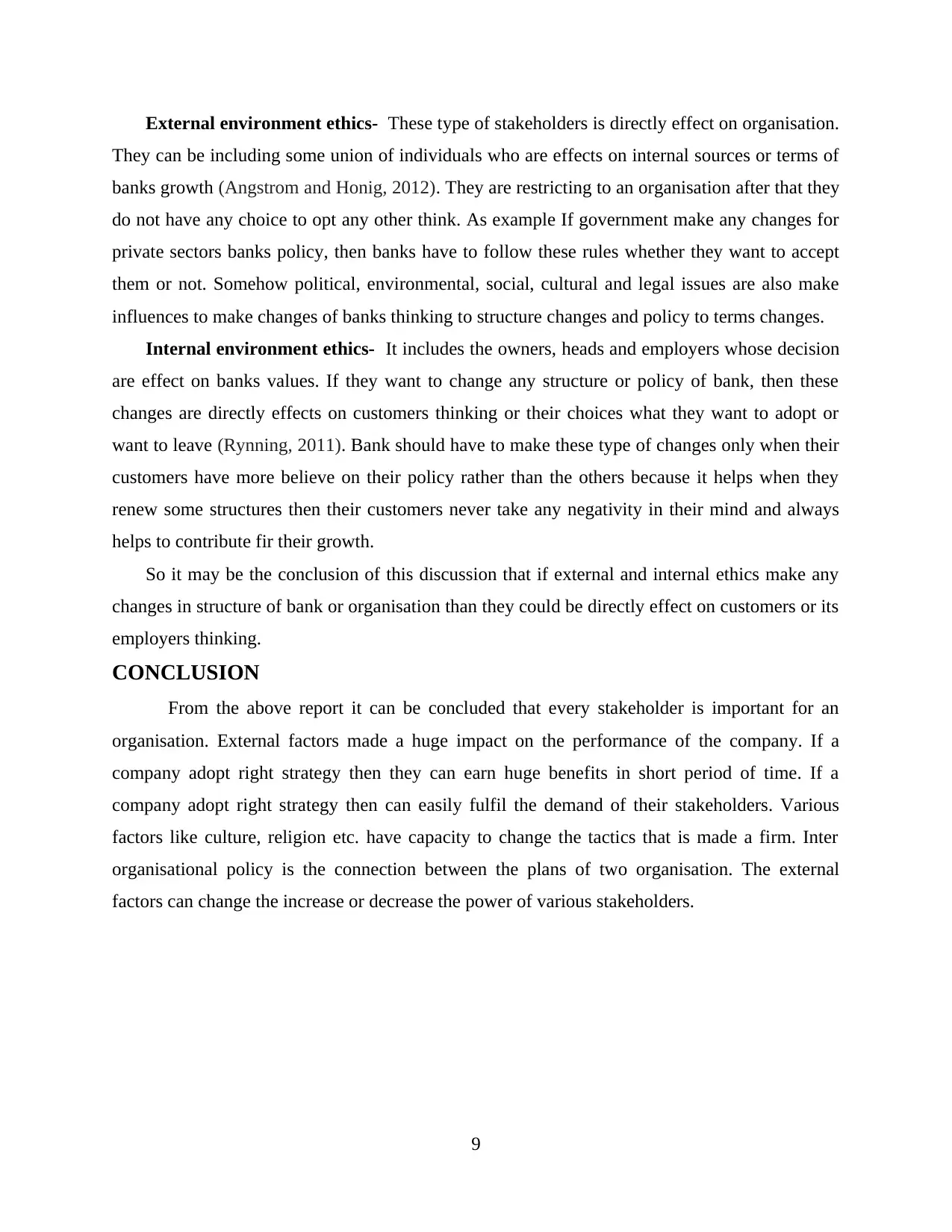
External environment ethics- These type of stakeholders is directly effect on organisation.
They can be including some union of individuals who are effects on internal sources or terms of
banks growth (Angstrom and Honig, 2012). They are restricting to an organisation after that they
do not have any choice to opt any other think. As example If government make any changes for
private sectors banks policy, then banks have to follow these rules whether they want to accept
them or not. Somehow political, environmental, social, cultural and legal issues are also make
influences to make changes of banks thinking to structure changes and policy to terms changes.
Internal environment ethics- It includes the owners, heads and employers whose decision
are effect on banks values. If they want to change any structure or policy of bank, then these
changes are directly effects on customers thinking or their choices what they want to adopt or
want to leave (Rynning, 2011). Bank should have to make these type of changes only when their
customers have more believe on their policy rather than the others because it helps when they
renew some structures then their customers never take any negativity in their mind and always
helps to contribute fir their growth.
So it may be the conclusion of this discussion that if external and internal ethics make any
changes in structure of bank or organisation than they could be directly effect on customers or its
employers thinking.
CONCLUSION
From the above report it can be concluded that every stakeholder is important for an
organisation. External factors made a huge impact on the performance of the company. If a
company adopt right strategy then they can earn huge benefits in short period of time. If a
company adopt right strategy then can easily fulfil the demand of their stakeholders. Various
factors like culture, religion etc. have capacity to change the tactics that is made a firm. Inter
organisational policy is the connection between the plans of two organisation. The external
factors can change the increase or decrease the power of various stakeholders.
9
They can be including some union of individuals who are effects on internal sources or terms of
banks growth (Angstrom and Honig, 2012). They are restricting to an organisation after that they
do not have any choice to opt any other think. As example If government make any changes for
private sectors banks policy, then banks have to follow these rules whether they want to accept
them or not. Somehow political, environmental, social, cultural and legal issues are also make
influences to make changes of banks thinking to structure changes and policy to terms changes.
Internal environment ethics- It includes the owners, heads and employers whose decision
are effect on banks values. If they want to change any structure or policy of bank, then these
changes are directly effects on customers thinking or their choices what they want to adopt or
want to leave (Rynning, 2011). Bank should have to make these type of changes only when their
customers have more believe on their policy rather than the others because it helps when they
renew some structures then their customers never take any negativity in their mind and always
helps to contribute fir their growth.
So it may be the conclusion of this discussion that if external and internal ethics make any
changes in structure of bank or organisation than they could be directly effect on customers or its
employers thinking.
CONCLUSION
From the above report it can be concluded that every stakeholder is important for an
organisation. External factors made a huge impact on the performance of the company. If a
company adopt right strategy then they can earn huge benefits in short period of time. If a
company adopt right strategy then can easily fulfil the demand of their stakeholders. Various
factors like culture, religion etc. have capacity to change the tactics that is made a firm. Inter
organisational policy is the connection between the plans of two organisation. The external
factors can change the increase or decrease the power of various stakeholders.
9
⊘ This is a preview!⊘
Do you want full access?
Subscribe today to unlock all pages.

Trusted by 1+ million students worldwide
1 out of 14
Related Documents
Your All-in-One AI-Powered Toolkit for Academic Success.
+13062052269
info@desklib.com
Available 24*7 on WhatsApp / Email
![[object Object]](/_next/static/media/star-bottom.7253800d.svg)
Unlock your academic potential
Copyright © 2020–2026 A2Z Services. All Rights Reserved. Developed and managed by ZUCOL.




